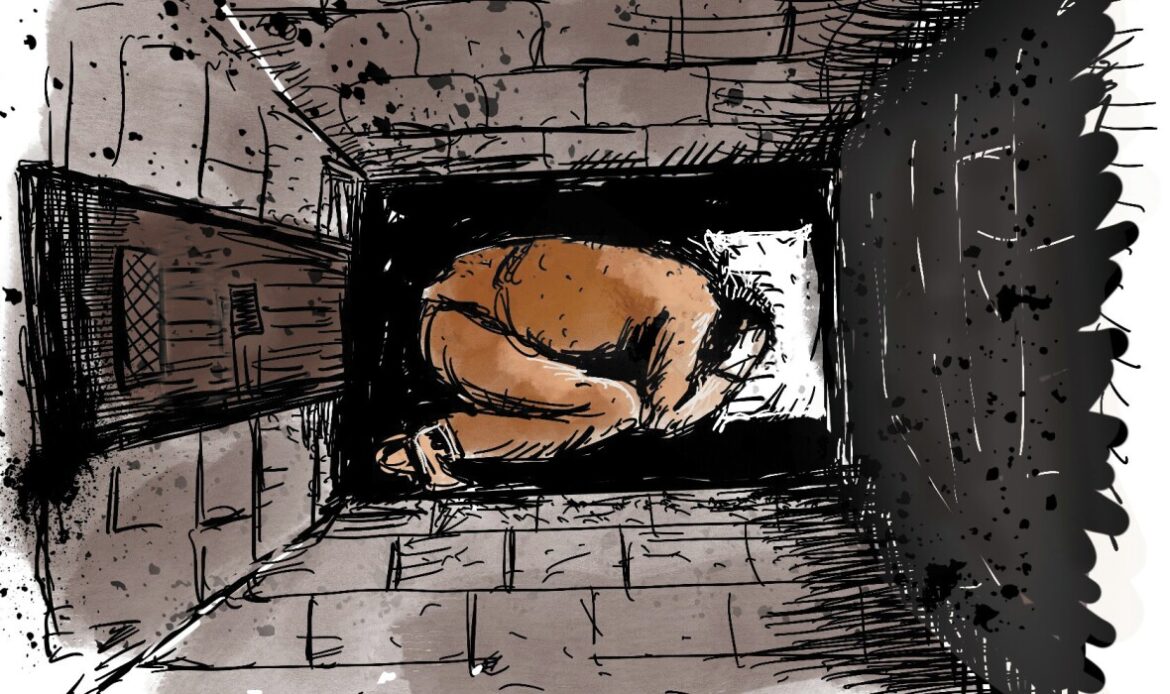
Author: Yara WHRD Center
It may seem trivial to speak of hidden psychological tortures that many prisoners face during detention, when there is so much suffering in our countries and when some prisoners suffer from physical torture and harm, but this is an important issue which we need to discuss and plan so that we can appropriately mitigate and reduce harm. In much of the middle east, political prisoners are largely viewed as unwavering and steadfast heroes who are invincible. However, based on testimonies of those detained, imprisoned, and interrogated, the experience tends to be more a blend of resistance and vulnerability, enduring and breaking, and pride and humiliation, often leading to traumas which can be lifelong. Therefore, it is important for us to think about and be aware of the state of the mental health political prisoners, during detention and after their release.
Depending on their economic and social status, gender, geographic location, ideology, political charges against them, age, political involvement, and prominence, detainees may experience different forms of trauma and abuse during their detention.
Some are subjected to physical torture, some experience verbal or physical sexual abuse, some are put in long-term solitary confinement and others experience short-term solitary confinement. Each person displays a different level of tolerance and resistance in the face of this violence.
For example, Yalda Aghafazli, a young woman who did not accept the charges against her during interrogations and went on a hunger strike to protest her condition, attempted suicide four days after her release and died in hospital. Although her motivation to commit suicide is unknown, in voice messages to her friend she eagerly described how she refused the charges against her and bravely resisted the pressures of interrogators. In another message she implied that she was severely pressured and harassed during detention.
Yalda Aghafazli’s experience demonstrates that even those who resist during detention and do not yield to the pressures of security forces while in detention, are not necessarily safe from the trauma of this bleak ordeal.
Mental health care is also necessary for detainees who were held in solitary confinement but may not have been necessarily subjected to physical and psychological torture and humiliation to coerce confessions. Solitary confinement itself amounts to torture.
Therefore, here we will examine the experience of solitary confinement, the harm associated with it and the necessary care in its aftermath.
Experience of Solitary Confinement: “I was shocked by its devastating power”
Civil society activist, Atefeh Nabavi, writes about the experience of solitary confinement: “First time I experienced solitary confinement, I was shocked by its devastating effects on me. You are left with your body and a mind that is solely focused on a single source of constant and traumatic anxiety: interrogation. Sometimes there is not even an interrogation, and the prisoner is left with uncertainty and in an endless void for long stretches of time.”
“The physical condition and design of solitary confinement; the permanent bright lighting, small space, lack of fresh air and natural light, and reigning absolute silence, breaks down the prisoner’s mental and physical structure.” Says Ehsan Mehrabi, a civil engineer and journalist, “Because I had studied civil engineering, when I entered the cell, I felt that if one was asked to draw the map of a grave, they would draw exactly what I was inside, and I felt that the person who had designed it seemed to have in actuality intended to do just that– design a grave.”
In the absence of sensory inputs, the absolute silence in solitary confinement may cause or contribute to mental disorders. Over time the prisoner will be deprived of his senses and will become vulnerable to false information suggested by the interrogator.
Some have reported hallucinating and blurring of their understanding between fantasy and reality while held in solitary confinement.
Numerous studies have shown that solitary confinement has severe psychological effects and increases the risk of acute injuries.
Furthermore, isolation and feelings of loneliness triggers suicidal thoughts and attempts of suicide.
Recent studies have found that solitary confinement increases the risk of premature deaths. According to an article published in the Journal of the American Academy of Psychiatry and Law, physical isolation can be as distressing and tormenting as physical torture.
Human beings need meaningful social interactions and isolation over time causes mental health problems.
According to research by Dr. Sharon Shalev, who has written a book on solitary confinement, people who experience solitary confinement are more likely to develop the following mental disorders:
- Anxiety and stress
- Depression and hopelessness
- Anger, hypersensitivity, and hostility
- Panic attacks
- Exacerbation of pre-existing mental disorders
- Hypersensitivity to smell and sound
- Difficulties related to concentration, memory, and attention
- Delusions that affect all senses
- Paranoia
- Poor impulse control
- Social avoidance
- Violent outbursts
- Psychosis
- Extreme fear of death
- Self-mutilation and suicide
Isolation, trauma, and psychological damage may also have physical manifestations, including chronic headaches, lethargy, impaired vision, dizziness, indigestion, excessive sweating, loss of appetite, muscle and joint pains, sleep disturbances, weight loss, and hand tremors. Therefore, it is important to take this issue seriously and provide relief while in solitary confinement and after release to mitigate these destructive effects.
Self-care in solitary confinement
Accounts and testimonies from individuals who have experienced solitary confinement, indicated that based on their circumstance and capabilities there are actions individuals can take to reduce the anxiety and subsequent harms of solitary confinement. Toward this end, it is critical to engage both the mind and body through any means possible to allow prisoners the ability to better endure this experience with minimal damage.
Physical activity: Solitary confinement usually takes place in an extremely tight space where the person spends the entire day without being able to move or walk freely.
However, many detainees say that physical activity and movement during this period has greatly improved their physical and mental health which in turn has made them more resilient. Do not underestimate the value of movement. In addition to strengthening your body and mind, exercising will give you a sense of order and a daily schedule, which is invaluable.
Stretching, bodybuilding, yoga, meditation, walking, using water bottles as dumbbells are all examples of activities that individuals have employed in solitary confinement to protect themselves from mental and physical traumas.
Mental activity: During solitary confinement, any activity that engages your mind helps protect your mental health and offsets the decline of cognitive functioning. From brain-training games, recalling happy memories with friends, family and loved ones, reviewing past interrogations, preparing for future interrogations, and most importantly using your imagination. Shiva NazarAhari, an Iranian activist who spent time in prison, including in solitary confinement explained: “Throughout my days and nights in solitary confinement, I would close my eyes and imagine being with my loved ones. In my mind, I would go to the places that I wanted to go, I would eat my favorite foods, and even lived out my dreams. Sometimes when I was running out of subjects, I would make up stories in my mind and play the main character. I owed all these inner adventures to my imagination, the stories, the details of which I would alter from time to time and re-imagine anew, the way I transported myself from that small cell to my favorite cafes chatting with my friends, allowed me an escape from that darkness into light. My imagination is what kept me alive.”
Nutrition: Severe anxiety and stress caused by solitary confinement and interrogation causes loss of appetite, weight loss and physical weakness. Meanwhile the food provided in detention is not necessarily healthy and does not provide for the needs of the body. However, it is very important to maintain a regular diet to prevent physical decline and drastic weight loss, to weather the interrogations. Even use of anti-anxiety medications may prove beneficial at times.
In some cases, prisoners may be allowed to purchase food from the prison commissary at their own expense. If you are given this opportunity and have the financial means to do so, use it to buy fruits and vegetables for healthy and nutritious meals.
Refrain from self-blame: Making a prisoner feel guilty is an interrogation technique used to dominate the individual. The interrogator tries to convince you that your family is in a dire situation. They may even falsely suggest that they have summoned or detained your friends or family members because of you. Blaming yourself for what your family and others close to you are going through is grueling. It severely weakens your mental state and fulfills the interrogator’s objective designed to obtain your admission of guilt, a false confession or merely to break your spirit. When confronted with feelings of guilt, remember that it is not you or your activities that have caused anguish to others, rather the main culprit is the repressive security system that does not tolerate peaceful civic activism.
Resources:
1. https://www.radiofarda.com/a/f12_documentary_on_solitary_confinement_1/24586301.html
2. https://www.sciencedirect.com/science/article/abs/pii/S016503271831694X
3. https://www.prisonpolicy.org/blog/2020/10/13/solitary_mortality_risk/


